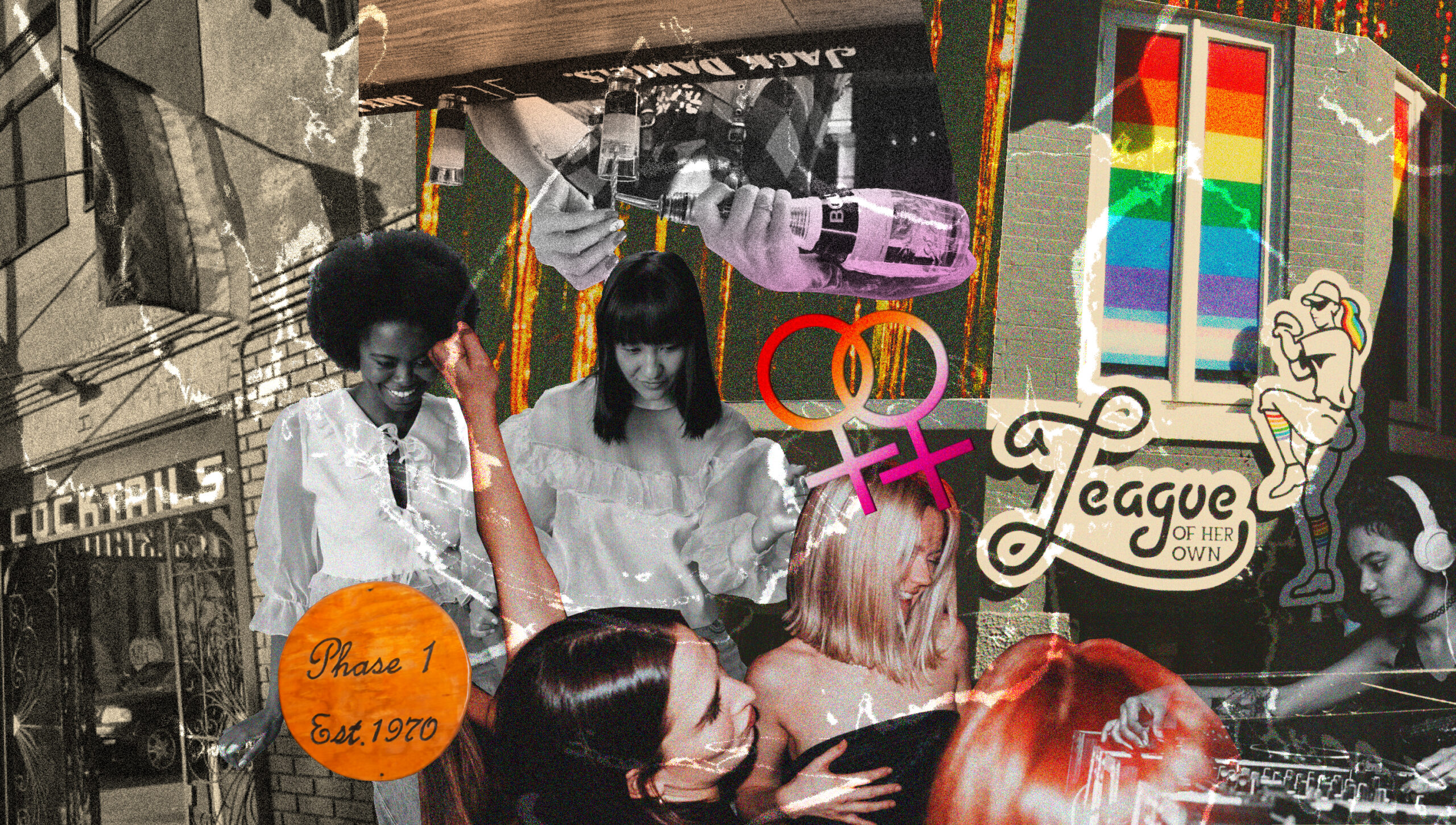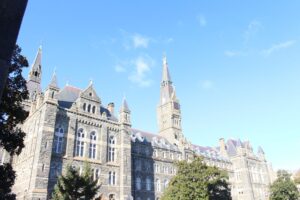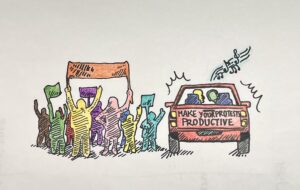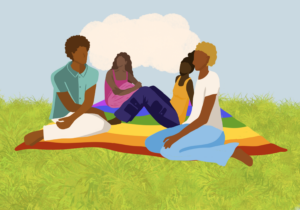Upon visiting As You Are Bar, Ai had a revelation. For the first time in over 30 years, she was dining out without anxiety.
“It’s enough that I have to walk down the street and men catcall me,” Ai reflected over a snack of chicken tenders in the bar’s lounge. “Not having to worry about a man coming up to me and making me feel uncomfortable while I’m eating has been a huge relief.”
Navigating the world as a queer woman—like Ai—can be full of these hazards; it’s why spaces dedicated to protecting lesbians are so important. Yet only a handful remain in the United States. In the 1980s, there were more than 200 lesbian bars across the country. Today, the Lesbian Bar Project estimates the number is around 20.
For those in D.C., the ever-shrinking lesbian nightlife scene may come as no surprise. The historic Phase One, after running for 45 years, closed in 2016, leaving the District without a lesbian bar for two years—until, in 2018, two new bars entered the scene. Both were the offspring of another business, sequestered in a smaller space in the basement or on the second floor, and only one still remains.
The one still open, A League of Her Own in Adams Morgan, is where Rach Pike and Jo McDaniel began incubating the idea for As You Are Bar: a multi-use café and bar, catering to lesbians and everyone beyond. It’s a lesbian-slash-queer bar—or, “a lesbian bar and,” as McDaniel calls it. The aspiration seemed ambitious: opening amid a trend of closures, to a crowd that increasingly views gay bars as a luxury rather than a necessity.
“Lesbian bars have ceased to exist in most cities,” said Lucas Hilderbrand, author of the upcoming book The Bars Are Ours. Gentrification of “gayborhoods” and the economics of pandemic lockdowns have made staying open untenable for many; queer people now have other ways to meet. But Hilderbrand argues that gay bars remain the “primary social institution of the gay community.”
Visiting As You Are’s two-story building off of the Eastern Market metro stop just weeks before their launch party in late March, opening still seemed far off. Cardboard boxes were stacked on dining tables; renovation permits were tied up in bureaucratic logjams. “It’s been one hurdle after another,” McDaniel said. “We’re hemorrhaging money. We can’t get open without doing this construction work; we can’t start it without a permit.”
Pike and McDaniel are committed to doing things the right way, whatever the cost. “A big deal to us is collaborating with groups, organizations, and individuals whose ethos and mission align with ours,” McDaniel said.
The two brought in a chef consultant, Nina Love, and a Black-owned coffee consulting company, No Wave Coffee, to develop their menu. Their coffee roaster, Thread Coffee, is queer-women and employee-owned. Instead of hiring through external job listings, Pike and McDaniel sought out potential employees through their connections to local nonprofits.
“Oftentimes, [the LGBTQ community is] either unemployed or underemployed, particularly our trans and gender non-conforming folks,” said June Crenshaw, the Executive Director of the Wanda Alston Foundation, which offers support services to LGBTQ youth at risk of experiencing houselessness. “It’s hard to find places in which we can go and work and be open and authentic, [where] our relationships can be regarded and respected.” Beyond simply staffing their bar, Pike and McDaniel want to help “pad the resumes” of those getting back on their feet.
“You don’t have to be the best bartender and barista,” Pike said. “You don’t have to have all those skills under your belt to start here. You have to buy into the importance of this safe culture. And if you can do that, we can teach you all the rest.”
McDaniel is invested in the power of language in making that safe culture a reality. “Shifting the narrative starts with the narrative, so we won’t say security,” she said. “Security secures property. Our team will be called safety management because safety management is here for people.” At the same time, safety isn’t just a buzzword to As You Are. Pike emphasized that employees will be taught strategies of de-escalation to avoid violent confrontations.
The concept for safety management pulls from Pike and McDaniel’s combined decades of experience in the service industry. McDaniel has worked behind the bar all over town, while Pike worked security at U Street gay bar Nellie’s before ultimately deciding to move on. The couple met while working at A League of Her Own and, for two years, they put “blood, sweat, and tears” into shifting that bar’s culture.
After briefly closing in the spring of 2020, Pitchers—the original establishment attached to A League of Her Own—reopened to massive upheaval in the District that summer. Marchers protesting police brutality in the wake of George Floyd’s murder trekked right by the bar’s doorstep. In quarantine, Pike and McDaniel had walked with protesters; now, they wanted to find a way to continue that support using the physical space they had at their disposal.
“We would bring bottles of water, we would let protesters use the restrooms,” said Pike. The basement became a place to duck into if cops roamed the sidewalks, a space for a breather along long protest routes. It was the two’s way of paying it forward to the community that sustains them. Yet the practice was unpopular with the owner, Dave Perruzza, who has been previously accused of racist practices. “That was not something ownership really liked that we were doing, and we weren’t willing to adjust,” said Pike. “If you continue to bring money into those spaces, you’re perpetuating and harboring discrimination and racism, and we were not going to do that.”
From there, the two tapped into the network they’d built over the years to begin the planning process for As You Are. The following summer, backlash against Nellie’s was reignited after a security guard forcefully dragged a young Black woman down the stairs. It was just the latest in a series of incidents where Black patrons felt targeted by the establishment’s staff. One of the first people Pike and McDaniel sat down with when outlining their space was Preston Mitchum, an activist who began the “boycottNellies” hashtag in 2017.
“As You Are is built by the community and with the community, not by Jo and I,” Pike said. Through a series of conversations, they identified the community needs that a new queer space would optimally fulfill.
Those needs, it turns out, are abundant. When lesbian bars abounded, queer women could pick and choose the vibe for the night. With so few left in the city, the bars now entice guests with wider swaths of interests. “Rach always says that the queer community touches every community,” McDaniel said. “That’s not just drinkers, that’s not just Friday night dancers. We want a place to come and read and know we’re going to be safe, or meet a date and know somebody’s keeping an eye on us.”
The variety built into As You Are’s design—café and lounge downstairs, bar and dance floor upstairs—makes for a little bit of something for everyone. Work up a sweat dancing or, for those who find a night of Mario Kart races to be more their speed, skip over to the game room.
Across from the Nintendo consoles is a gallery wall of for-sale art from local queer artists. “If we have some space, we want it to be used in a really ethos-driven way,” Pike said. “So if we’ve got walls, we don’t need to decorate and paint them. We’ll let the community do that.”
Dancing only takes place two nights a week, Pike pointed out, leaving the floor open for groups to commune at other times. The community has the opportunity to create its own programs, and there aren’t “many caps,” they said. These events include a cornhole league, bingo, storytelling troupe performances, lunch and learns, and drag king showcases. They can be fun, or they can be political, or a little bit of both. “I look forward to protest signs being made on our dance floor, people sitting around with markers and poster board,” McDaniel added.
Pike and McDaniel intentionally sought to bring in non-drinkers in order to touch parts of the community that bars can’t. Creating safe spaces for younger people, specifically, has taken on a renewed urgency as state legislatures across the country have taken aim at LGBTQ-friendly curriculums and gender-affirming care for transgender teens. “Since the Defensive of Marriage Act was repealed in 2013, anti-trans legislation has skyrocketed,” McDaniel explained. “And a lot of that is because the people who were fighting for gay marriage have stopped being activists.”
Queer and questioning teenagers need somewhere to call their own and come into their own when their schoolyards and homes are out of the question. As You Are seeks to do better by gay and trans youth who need somewhere to just be. In the daylight, the café is open for after-school hangouts; after hours, the dance floor is open to the 18-and-up crowd to include underage college students.
The couple still remembers their first gay bar experiences—how it made life seem bigger than, as Pike light-heartedly described, a “small little podunk-y town.” Originally from east of Cleveland, a newly adult Pike snuck out of the house and found shelter in a nightclub called Bounce. She had fielded judgmental glances their whole adolescent life for having short hair—but at Bounce’s ladies’ night, those looks meant something a little different. “It was the first time I had been stared at out of admiration or attraction and not confusion,” said Pike.
Despite the perils of being publicly out, queer people throughout history have sought out spaces where they could similarly feel seen. In the mid-twentieth century, many flocked to the Southeast neighborhood of D.C.—then, a heavily industrialized area full of empty warehouses. As the century wore on, two distinct spheres of nightlife emerged there. Patrons would hop from the rowdier dance clubs near where Nationals Park stands today, over to the chiller bars on 8th Street, SE for a nightcap. The latter was nicknamed “The Gay Way” for the sheer number of LGBTQ-owned establishments it once held.
Today, nearly all of these businesses have been gentrified out of existence. But Ty Ginter, co-founder of D.C. Dykaries, an organization dedicated to preserving the memory of lesbian bars in D.C., hopes Pike and McDaniel will steward the rapidly disappearing history of a queer Capitol Hill. “None of the original buildings are there anymore,” Ginter said of the Southeast neighborhood of D.C. “They’ve all been paved over for these high-rises. It’s basically this queer space graveyard.”
There have been attempts to bring gay bars back to the commercial corridor: in 2018, the high-end, 1920s-themed Orchid opened, though it shut down just over a year later. “[As You Are is] doing a lot of new things that I’m hoping keep them alive and separate them from the legacy of death on Eighth Street,” Ginter said. Down the street, even Phase One—previously the oldest continually operating lesbian bar in the United States—eventually shuttered in 2016.
A product of when they were built, older lesbian bars were designed to cloister those inside from the outside world—Phase One remained a windowless, furtive space until the day it closed. As You Are has opted instead for an ethos of inclusivity and transparency. In response to neighbors’ concerns about the possibility of noise, Pike and McDaniel revamped the upstairs dancefloor with soundproof panels and triple-layered drapes. “They’ve got a lot to learn about us,” Pike said in response to the—at times—borderline homophobic complaints. “And, thankfully, we have the chance to show them.” It’s one of the reasons all are welcome in; visibility has the capacity to change minds.
At Phase One’s door, bouncers turned away every man without a female chaperone. Originally, the intent was to insulate the women-focused space from hostile Navy Yard marines. But this type of binary thinking has no place in today’s lesbian bar scene, argued Pike, who is genderqueer. “Now, [Phase One’s policy] would be a very exclusive rule that would not include so many of the people in the community,” they said. Not all lesbians are women, and conflating sexuality and gender in that manner threatens to erase transmasculine and nonbinary individuals, who have historically sought refuge within lesbian spaces.
At As You Are, Pike and McDaniel said, basic respect for others will be the only criteria for entry. “When you walk in this door, you know everybody in here is supportive of queer culture, whether they are part of it or not,” Pike said. “You can just come and be yourself. Walk in here—literally as you are—and be welcomed.”
For the time being, Ai doesn’t feel she can safely come out. Part of the appeal of As You Are for Ai is that there’s no pressure to vocalize any part of your identity before you’re ready. “Jo and Rach always mentioned you don’t need to be out,” she explained. “That will always be on your terms.”
On a Saturday afternoon, the bar is bustling but subdued enough for introverts like Ai, who is Autistic and prefers socialization away from the sensory stimuli of the dance floor and booming speakers. “Not everyone drinks. Not everyone likes to party. Some folks want to have a more laid-back approach like this,” Ai said.
By the coffee bar hangs the progress Pride flag, rolling the rainbow and trans Pride flags into one, with stripes of black and brown. On the couch, a man slings an arm over a lover’s shoulder, while two women have an animated conversation in sign language a table over. “I like that it is not specifically a lesbian bar—it’s a queer bar,” Ai said. To her, “queer” encompasses a broader spectrum of the community.
But while Ai celebrates this new inclusive model, some lesbians bristle at the suggestion of relinquishing the term “lesbian bar,” fearing a loss of specificity forged out of that categorical marker. Once distinctly feminist spots, lesbian bars becoming more inclusive also means alienating those who seek out the sanctuary of women-only spaces.
Objections aren’t one-size-fits-all, and neither are the solutions. Keeping multiple generations happy and rent paid may not always be possible, Ginter cautioned. “[Older generations] don’t feel comfortable in the spaces anymore, because it’s not what they grew up with. It’s not what they’re used to. Right? And I don’t know what the middle ground is.”
Keeping history alive, in this case, may—superficially—appear like moving on from it. Lisa Cannistraci, owner of NYC’s West Village watering hole Henrietta Hudson (the self-declared “Madonna of lesbian bars”) notes that this has always been the case. Every seven years, she updates the now-iconic establishment’s language and business model. The bar remains lesbian-centric and lesbian-owned, but identifies itself as a queer bar.
It’s a model other lesbian bars may want to emulate, Ginter said. “The spaces that I’ve seen survive have done a really good job of keeping up with the times,” they explained. “They’ve been informed by the past, but they are still looking to the future.” Once D.C. Dykaries’ walking tours of the city’s “gayborhoods” begin again, As You Are will be one of its final resting stops: to conclude a remembrance of past businesses, walkers will be able to patronize a living queer bar.
Queer heritage isn’t passed down by blood, Ginter stressed—it has to be nurtured. Far more than square footage, lesbian bars represent a cultivated bond, a staked claim, tying the past to future generations. Losing one link threatens to break the chain. What Pike and McDaniel are doing with As You Are—and their appearance in the Lesbian Bar Project’s short documentary—is “unerasable,” Pike said. “I look back at photos from the ’80s and the ’70s of queer history, and I’m in awe. And one day we’ll be part of that queer history that somebody looks back on.”
Now, all Pike and McDaniel can hope is that the community they’ve so heavily invested in will come out to support their collective vision. “It’s taken us some time, and it’s cost us some money,” Pike said, but they’re not too concerned about lost days or capital, so long as As You Are breaks the cycle of closures. “All we’re in this for is to be sustainable. We’re not trying to line our pockets.”
The model they’re toying with is still in its infancy—yet to stand the test of time. But if anyone could succeed, Ginter said, it would be Pike and McDaniel.
“They have the street cred,” they said. “It’s whether or not the queer community wants to step up and spend the money.”






